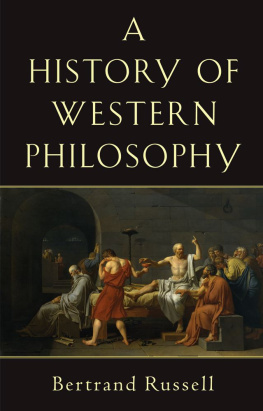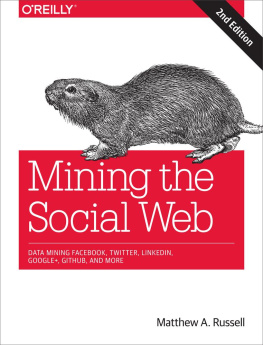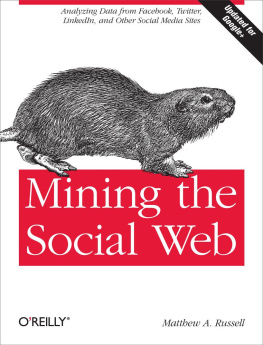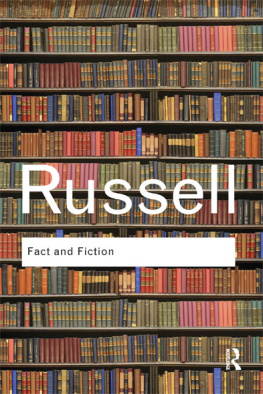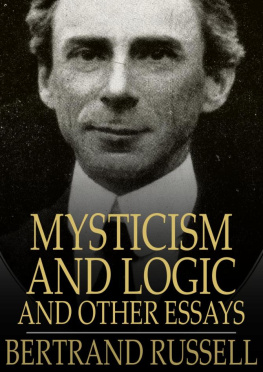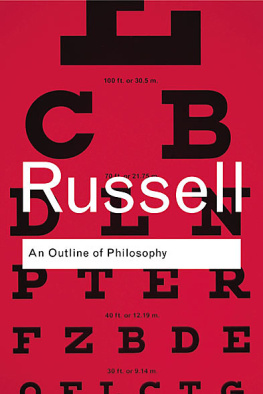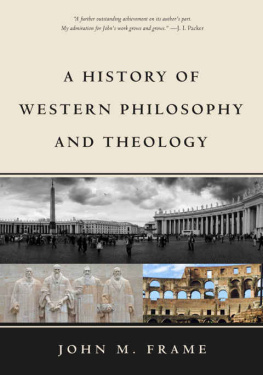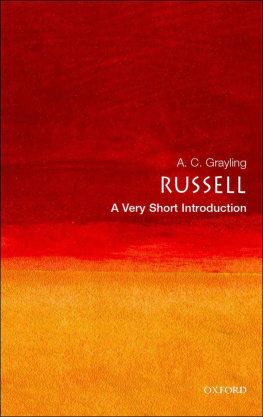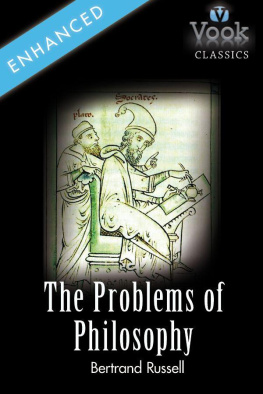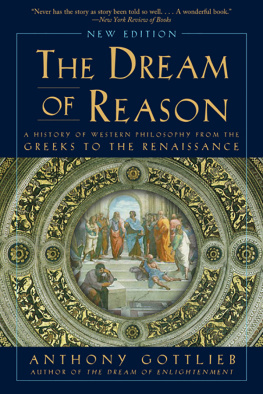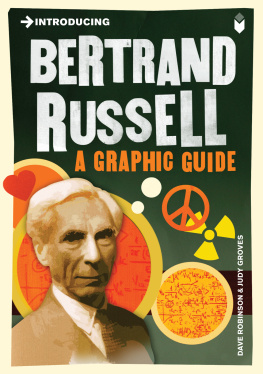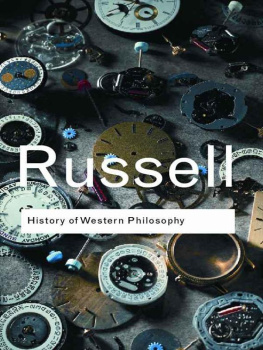Russell - A History of Western Philosophy
Here you can read online Russell - A History of Western Philosophy full text of the book (entire story) in english for free. Download pdf and epub, get meaning, cover and reviews about this ebook. City: New York, year: 2009, publisher: Simon and Schuster;Routledge, genre: Religion. Description of the work, (preface) as well as reviews are available. Best literature library LitArk.com created for fans of good reading and offers a wide selection of genres:
Romance novel
Science fiction
Adventure
Detective
Science
History
Home and family
Prose
Art
Politics
Computer
Non-fiction
Religion
Business
Children
Humor
Choose a favorite category and find really read worthwhile books. Enjoy immersion in the world of imagination, feel the emotions of the characters or learn something new for yourself, make an fascinating discovery.
A History of Western Philosophy: summary, description and annotation
We offer to read an annotation, description, summary or preface (depends on what the author of the book "A History of Western Philosophy" wrote himself). If you haven't found the necessary information about the book — write in the comments, we will try to find it.
A History of Western Philosophy — read online for free the complete book (whole text) full work
Below is the text of the book, divided by pages. System saving the place of the last page read, allows you to conveniently read the book "A History of Western Philosophy" online for free, without having to search again every time where you left off. Put a bookmark, and you can go to the page where you finished reading at any time.
Font size:
Interval:
Bookmark:


COPYRIGHT 1945 BY BERTRAND RUSSELL
COPYRIGHT RENEWED 1972 BY EDITH RUSSELL
ALL RIGHTS RESERVED INCLUDING THE RIGHT OF REPRODUCTION IN WHOLE OR IN PART IN ANY FORM
A TOUCHSTONE BOOK
PUBLISHED BY SIMON & SCHUSTER, INC.
ROCKEFELLER CENTER, 1230 AVENUE OF THE AMERICAS
NEW YORK, NEW YORK 10020
TOUCHSTONE AND COLOPHON ARE REGISTERED TRADEMARKS OF SIMON & SCHUSTER, INC.
ISBN-13: 978-1-4165-9915-9
ISBN-10: 1-4165-9915-0
Visit us on the World Wide Web:
http://www.SimonSays.com


M ANY histories of philosophy exist, and it has not been my purpose merely to add one to their number. My purpose is to exhibit philosophy as an integral part of social and political life: not as the isolated speculations of remarkable individuals, but as both an effect and a cause of the character of the various communities in which different systems flourished. This purpose demands more account of general history than is usually given by historians of philosophy. I have found this particularly necessary as regards periods with which the general reader cannot be assumed to be familiar. The great age of the scholastic philosophy was an outcome of the reforms of the eleventh century, and these, in turn, were a reaction against previous corruption. Without some knowledge of the centuries between the fall of Rome and the rise of the medieval Papacy, the intellectual atmosphere of the twelfth and thirteenth centuries can hardly be understood. In dealing with this period, as with others, I have aimed at giving only so much general history as I thought necessary for the sympathetic comprehension of philosophers in relation to the times that formed them and the times that they helped to form.
One consequence of this point of view is that the importance which it gives to a philosopher is often not that which he deserves on account of his philosophic merit. For my part, for example, I consider Spinoza a greater philosopher than Locke, but he was far less influential; I have therefore treated him much more briefly than Locke. Some menfor example, Rousseau and Byronthough not philosophers at all in the academic sense, have so profoundly affected the prevailing philosophic temper that the development of philosophy cannot be understood if they are ignored. Even pure men of action are sometimes of great importance in this respect; very few philosophers have influenced philosophy as much as Alexander the Great, Charlemagne, or Napoleon. Lycurgus, if only he had existed, would have been a still more notable example.
In attempting to cover such a vast stretch of time, it is necessary to have very drastic principles of selection. I have come to the conclusion, from reading standard histories of philosophy, that very short accounts convey nothing of value to the reader; I have therefore omitted altogether (with few exceptions) men who did not seem to me to deserve a fairly full treatment. In the case of the men whom I have discussed, I have mentioned what seemed relevant as regards their lives and their social surroundings; I have even sometimes recorded intrinsically unimportant details when I considered them illustrative of a man or of his times.
Finally, I owe a word of explanation and apology to specialists on any part of my enormous subject. It is obviously impossible to know as much about every philosopher as can be known about him by a man whose field is less wide; I have no doubt that every single philosopher whom I have mentioned, with the exception of Leibniz, is better known to many men than to me. If, however, this were considered a sufficient reason for respectful silence, it would follow that no man should undertake to treat of more than some narrow strip of history. The influence of Sparta on Rousseau, of Plato on Christian philosophy until the thirteenth century, of the Nestorians on the Arabs and thence on Aquinas, of Saint Ambrose on liberal political philosophy from the rise of the Lombard cities until the present day, are some among the themes of which only a comprehensive history can treat. On such grounds I ask the indulgence of those readers who find my knowledge of this or that portion of my subject less adequate than it would have been if there had been no need to remember times winged chariot.
This book owes its existence to Dr. Albert C. Barnes, having been originally designed and partly delivered as lectures at the Barnes Foundation in Pennsylvania.
As in most of my work during the last thirteen years, I have been greatly assisted, in research and in many other ways, by my wife, Patricia Russell.
BERTRAND RUSSELL

T HE conceptions of life and the world which we call philosophical are a product of two factors: one, inherited religious and ethical conceptions; the other, the sort of investigation which may be called scientific, using this word in its broadest sense. Individual philosophers have differed widely in regard to the proportions in which these two factors entered into their systems, but it is the presence of both, in some degree, that characterizes philosophy.
Philosophy is a word which has been used in many ways, some wider, some narrower. I propose to use it in a very wide sense, which I will now try to explain.
Philosophy, as I shall understand the word, is something intermediate between theology and science. Like theology, it consists of speculations on matters as to which definite knowledge has, so far, been unascertainable; but like science, it appeals to human reason rather than to authority, whether that of tradition or that of revelation. All definite knowledgeso I should contendbelongs to science; all dogma as to what surpasses definite knowledge belongs to theology. But between theology and science there is a No Mans Land, exposed to attack from both sides; this No Mans Land is philosophy. Almost all the questions of most interest to speculative minds are such as science cannot answer, and the confident answers of theologians no longer seem so convincing as they did in former centuries. Is the world divided into mind and matter, and, if so, what is mind and what is matter? Is mind subject to matter, or is it possessed of independent powers? Has the universe any unity or purpose? Is it evolving towards some goal? Are there really laws of nature, or do we believe in them only because of our innate love of order? Is man what he seems to the astronomer, a tiny lump of impure carbon and water impotently crawling on a small and unimportant planet? Or is he what he appears to Hamlet? Is he perhaps both at once? Is there a way of living that is noble and another that is base, or are all ways of living merely futile? If there is a way of living that is noble, in what does it consist, and how shall we achieve it? Must the good be eternal in order to deserve to be valued, or is it worth seeking even if the universe is inexorably moving towards death? Is there such a thing as wisdom, or is what seems such merely the ultimate refinement of folly? To such questions no answer can be found in the laboratory. Theologies have professed to give answers, all too definite; but their very definiteness causes modern minds to view them with suspicion. The studying of these questions, if not the answering of them, is the business of philosophy.
Font size:
Interval:
Bookmark:
Similar books «A History of Western Philosophy»
Look at similar books to A History of Western Philosophy. We have selected literature similar in name and meaning in the hope of providing readers with more options to find new, interesting, not yet read works.
Discussion, reviews of the book A History of Western Philosophy and just readers' own opinions. Leave your comments, write what you think about the work, its meaning or the main characters. Specify what exactly you liked and what you didn't like, and why you think so.

